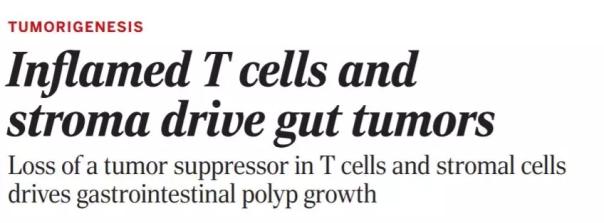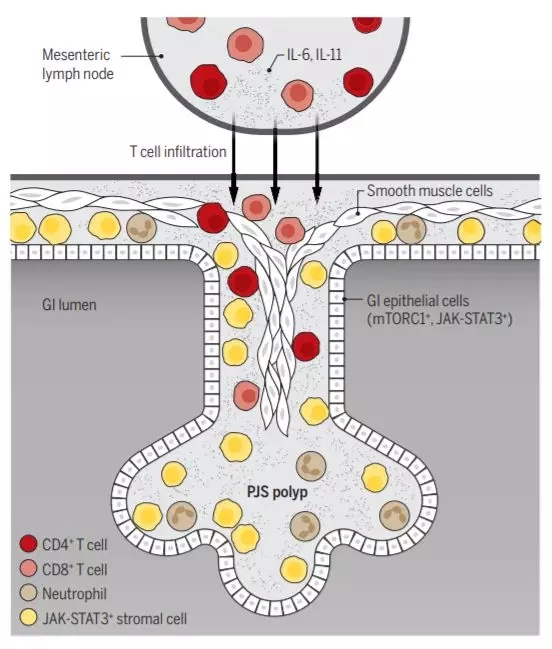Science: Immune cell disorders can also cause cancer
Science: Immune cell disorders can also cause cancer
July 30, 2018 Source: Academic Jingwei
Window._bd_share_config={ "common":{ "bdSnsKey":{ },"bdText":"","bdMini":"2","bdMiniList":false,"bdPic":"","bdStyle":" 0","bdSize":"16"},"share":{ }};with(document)0[(getElementsByTagName('head')[0]||body).appendChild(createElement('script')) .src='http://bdimg.share.baidu.com/static/api/js/share.js?v=89860593.js?cdnversion='+~(-new Date()/36e5)];We know that the immune system is closely related to cancer. But people usually just think that cancer can paralyze the immune system and escape the latter's attacks. A study in the latest issue of Science this week found that the imbalance of immune cells may directly cause cancer. This research has also received extensive attention in the field of biomedicine.

â–²This article was published in the same period of the "Science" magazine article (Source: "Science")
The initial cause of the study was a rare disease called the Pertz-Jaggers syndrome. The disease is caused by a mutation in the tumor suppressor gene STK11. Initially, dark freckles grow in the eyes and mouth of the patient, and a large number of benign polyps grow in the digestive tract. But by the age of 65, the risk of cancer in these patients will increase dramatically - more than 90% of patients will develop cancers such as pancreatic cancer, stomach cancer, ovarian cancer, cervical cancer, and breast cancer. For this particular disease, we currently have no medicine available.
Since STK11 is a tumor suppressor gene, our research on this disease has often focused on the cells it affects. However, for this genetic disease, almost all cells in the patient have this mutation, which cells are the key to cancer attacks? We still have no answer to this question. In order to find such an answer, a research team from Canada and the United States did a clever experiment. They designed a mouse model and selectively knocked out a STK11 gene in different cell types. According to their assumptions, after a certain type of cells lack this gene, as long as the mice are ill, it means that such cells play a key role in the occurrence of the disease.
No one thought that the type of cells they found turned out to be immune T cells!
This discovery is very interesting. As we mentioned earlier, many polyps grow in the digestive tract of the patient, and the mutation of the epithelial cells of the digestive tract does not cause the formation of polyps. What role does T cells, which seem to have nothing to do with digestive polyps, play a role in it?

â–²Illustration of this study (Source: Science)
Subsequent studies first ruled out the classical signaling pathway. Previously, it was found that the protein encoded by STK11 is involved in the activation of AMPK, while the latter inhibits the expression of mTORC1. Scientists originally thought that after STK11 was inactivated, the expression of mTROC1 would increase and affect tumor formation. However, inhibition of AMPK in T cells promotes the expression of mTROC1 and does not lead to the growth of polyps; in addition, even if mTROC1 is inhibited, the potential disease pathway is interfered with, and polyps still occur. Based on these results, the researchers believe that a new signaling pathway is involved in the onset of the disease.
Further exploration revealed that in human and mouse polyps, immune cell infiltration and STAT3 signaling pathways were enhanced. In addition, the levels of inflammatory cytokines such as IL-6 in polyps will also increase. By targeting these signaling pathways, or T cells, polyp growth can be improved. This is expected to bring new ideas to the treatment of this disease: At present, we have some new drug molecules for STAT3, which may bring the gospel to patients.
“In the laboratory, randomized discovery of basic science can find new ideas for the cause of the disease and potentially bring new treatment options. This research is an excellent case,†said Professor Russell Jones, one of the co-authors of the study: "Further investigations have shown that this is not a simple random result. Mutations in mice's T cells produce inflammation in the digestive tract, which produces a polyp similar to that of patients with Petz-Jaggers syndrome."
This research allows us to consider the relationship between the immune system and cancer from a new perspective and is expected to find a way to treat cancer in the digestive tract. Researchers say they are excited about this prospect.
The title of this article is from Pixabay
Reference materials:
[1] LKB1 deficiency in T cells promotes the development of gastrointestinal polyposis
[2] Inflamed T cells and stroma drive gut tumors
[3] Rewriting our understanding of gastric tumors
Electric Cable Reel,Electric Hose Reel,Electric Garden Hose Reel,Retractable Electric Cord Reel
NINGBO QIKAI ENVIRONMENTAL TECHNOLOGY CO.,LTD , https://www.water-hose-reel.com